Merkle Tree Capital offers digital asset fund offering exposure to bitcoin and other crypto assets
This Melbourne-based investment manager is buying up bitcoin, amid criticisms the industry is buying up too many expensive TV ads and sports deals despite widespread lay-offs.

In the face of an ongoing crypto bloodbath, Melbourne-based Merkle Tree Capital, led by former BlackRock asset manager Ryan McMillin, is ramping up its cryptocurrency investments, and says it has received Australia’s first investment grade-rating for a diversified digital asset fund.
The MTC Digital Asset Fund offers exposure to several crypto assets including bitcoin, ethereum, solana and avalanche, and is aimed at high net worth individuals, family office investors and self-managed super funds, according to co-founder McMillin. The fund received the rating from research house Independent Investment Research (IIR).
“Web3 and the Metaverse represent a once in a generation investment opportunity, after the recent market correction this is akin to investing in FANNG stocks in the early 2000s,” Mr McMillin said.
“We’ve worked really hard to create an institutional grade strategy providing wholesale investors with simple and secure access to these blockchain-based businesses and infrastructure.
“This [rating] is an important step in the evolution of local digital asset investment, giving the adviser community access to a more sophisticated proposition with an independent rating that will support its addition to approved product lists.”
In the course of rating a fund, IIR considers product management, underlying product construction, investment management, team stability, experience and performance, fees, risks and likely outcomes.

Mr McMillin and Dean Serroni founded Merkle Tree Capital in June 2021 with the stated aim of providing access to crypto assets via their MTC Digital Asset Fund.
Bitcoin has shed 57 per cent so far this year, falling below $US20,000 recently for the first time since December 2020, while firms including Crypto.com, BlockFi, and Coinbase have laid off hundreds of staff globally.
Mr McMillin, a former hedge fund manager with BlackRock and RBS Investment Bank, said his firm subscribes to the Markowitz ‘diversification is the only free lunch’ theory.
“In addition to holdings in bitcoin and ethereum, we have spread the risk across multiple Layer 1 protocols that are staked within secure institutional custody. This means investors are earning a yield of around 5 per cent on the entire portfolio,” he said.
“One other fundamental difference is the fund is benchmarked against bitcoin as opposed to absolute returns, we feel this best aligns with investor interests. In this regard, we’ve outperformed bitcoin most months since inception.”
Mr Serroni said he disagreed with the sentiment that innovations in the crypto space serve no purpose.
“Blockchain technology is changing the world, and it’s our job to educate the market on the value proposition.”
Meanwhile, Nigel Green, the chief executive of one of the world’s largest independent financial advisory firms, deVere Group, said for the last few year bitcoin has been quietly establishing itself as the next global reserve currency.
“No longer is it the magic, obscure money of the internet,” Mr Green said.
“It is rivalling in size some of the biggest currencies in the world – in October last year it surpassed the Swiss franc – which is highly impressive since it was only launched in 2009.
“It’s being increasingly accumulated by both institutional and retail investors, major corporations, and governments, among others. Indeed, it is now legal tender in two countries, with several more nations likely to follow suit in the near future.”

Mr Green, who is still accumulating bitcoin, criticised some major crypto firms for making expensive TV ads and signing sports sponsorship deals amid widespread crypto industry lay-offs.
“I’m not in the habit of throwing shade at other companies, but in recent times we’ve seen many of the biggest players make huge, unnecessary mistakes,” he said.
“They went for enormously expensive TV ads, jumped on highest-tier sponsorships, rolled-out lending models offering astronomical interest rates on crypto deposits, and launched unprecedented hiring sprees.
“Now, what do we have? Firms laying off swathes of staff, freezing client withdrawals and cutting back on investment.”
“Unfortunately, these brands have made some classic, obvious and avoidable dotcom era errors. Such crypto firms would be better off – for the sake of their clients and the wider industry – growing through investing in top talent, innovation and development, and lobbying for sensible regulation with financial watchdogs.”







To join the conversation, please log in. Don't have an account? Register
Join the conversation, you are commenting as Logout